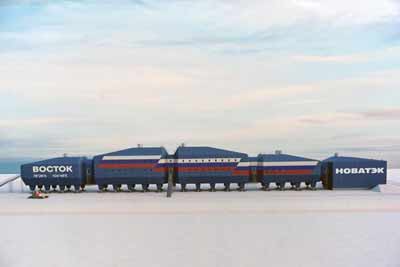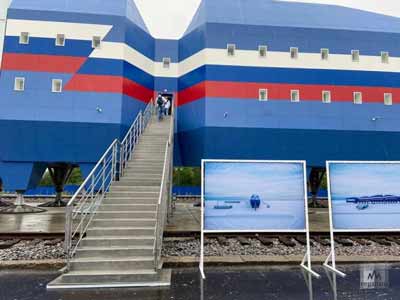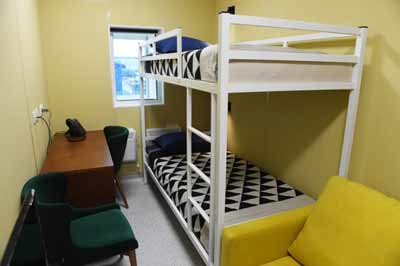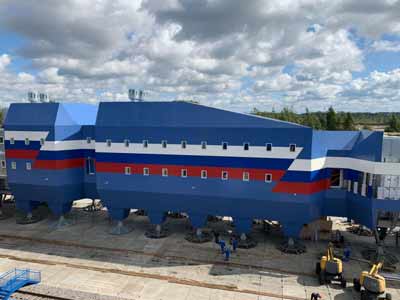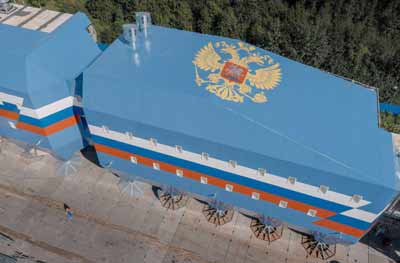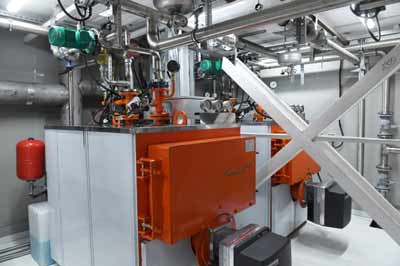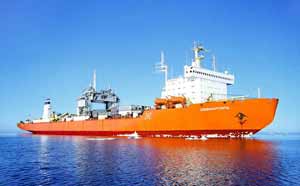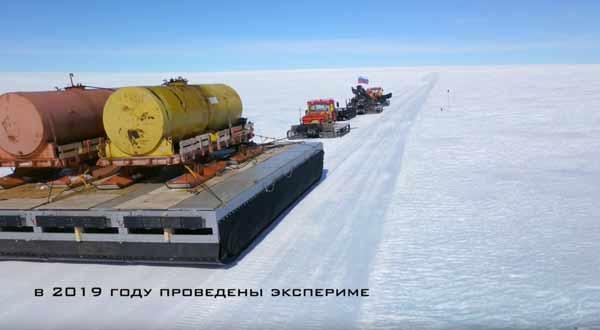A New Vostok!
 Above, an undated conceptual drawing of the new station (this and other photos of the new station were released by Russia's Ministry of Natural Resources unless otherwise indicated). 27 December 2020 update: after leaving St. Petersburg on 5 October, Sevmorput headed south at 18 knots...until about the 16th when it was west of Angola...when it started zigzagging north and south at 6-7 knots...attracting attention and prompting this 20 October Barents Observer article. The vessel operator Rosatomflot was not forthcoming with information about the ship's condition, as mentioned in this 13 November Barents Observer article. Since Sevmorput was nuclear powered, it could not make port in Luanda, Angola. So, after it was determined that one of the four blades on the single screw had probably broken off, a team of Russian divers was flown to the vessel to investigate...they cut off the opposite blade and made things symmetrical so that the vessel could at least operate at a greater speed without excessive vibration; this work was underway on 18 November. The decision was then made for the Sevmorput to return to St. Petersburg where the Vostok station components would be offloaded before the vessel entered drydock for repairs. Sevmorput was to be assisted at the ice edge as needed by the icebreaker Kapitan Dranitsyn, which had left Murmansk on 27 September for Progress. It carried about 98 construction workers who were to assist with the offload at Progress and initial preparation for the traverses to Vostok. The icebreaker arrived at Progress in early November, returned north to Cape Town for fuel and supplies, and then continued north to accompany Sevmorput. This and more information can be found in this 26 November Barents Observer article as well as this 22 December meduza.io article and this 26 November kommersant.ru article (in Russian, use your favorite translator). In any case, it appears that the new Vostok construction project will be delayed for at least a year. But...there is more. The Captain of Sevmorput was medevaced off the ship by helicopter to the Canary Islands in the third week of December; he was flown to Las Palmas with meningitis symptoms. As of now (2326 UTC 27 December) the vessel was in the Baltic Sea at 54ºN-12ºE and was expected to reach St. Petersburg on the 30th.
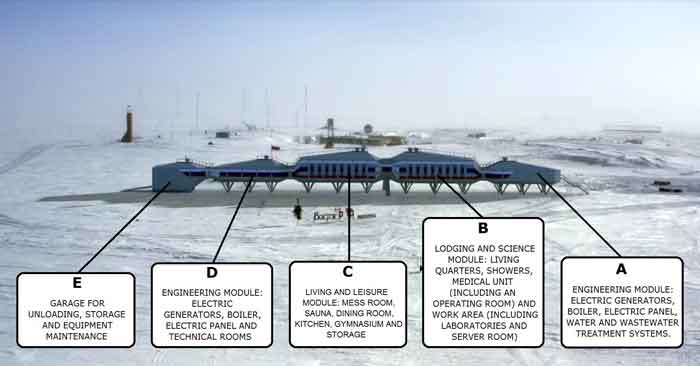 Above, a conceptual drawing of the new station released in March of 2020. It shows the other side of the new station, identifies the various modules, and depicts the proposed location of the new structure relative to the existing station facilities. Source: @Antarctic_Infra (X post), which also includes the layout images below.  During the 2019-20 summer season, preliminary grading and compaction was conducted at the station site, additional fuel was supplied to Progress (where the station materials are to be delivered), construction camp modules were also delivered, and fuel bases were set up on the traverse route from Progress to Vostok. At present, the structure is being disassembled for shipment south to Progress station aboard the nuclear cargo icebreaker (more on the deployment and traverse delivery below). So...let's have a look at the new station before it was being disassembled for shipment. All of these photos come from this archived 27 August 2020 press release from Russia's Ministry of Natural Resources unless otherwise indicated (use your favorite translator): 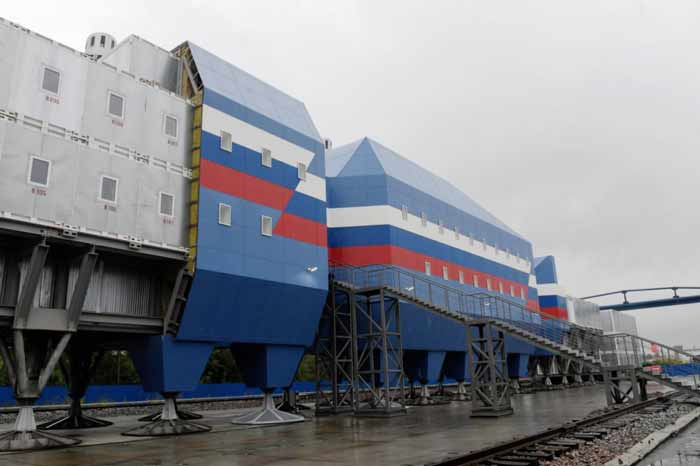 This is probably the most revealing photo of the station trial assembly...although there is that facade with colors of the Russian flag...it is apparent that the actual station components are the size of shipping containers, as they will be transported to Vostok. I'm wondering if insulation will be installed between the structure and the facade. | |
|
...which consisted of Russia's Deputy Prime Minister Viktoria Abramchenko; Minister of Natural Resources and Environment Dmitry Kobylkin; Head of Roshydromet Igor Shumakov; Leningrad Region Governor Alexander Drozdenko; and Novatek Chairman of the Board Leonid Mikhelson. I can't identify these people in the various uncaptioned photos, which come from the Ministry of National Resources and Environment website mentioned above. The station is designed to support 15 winterovers and 35 summer folks...some of the new station statistics include: 22 single winterover rooms, 13 seasonal personnel rooms, glaciological and andvanced research labs, 7 rooms devoted to kitchen, mess, and food storage, rest and recreation areas including a pool table and fitness equipment, a hydroponic greenhouse, medical facilities, sauna, laundry room, water supply and conditioning equipment, power plant, heated garage, workshop spaces, a 60kw emergency power plant (note that the current Vostok power plant is capable of 270kw!), a 550 tonne diesel fuel cache, and a solar battery farm to generate power during the summer. Completion is scheduled for 2023-24...and the old Vostok structures will be retrograded. The information in this paragraph is from Russia's report presented at the 2019 Antarctic Treaty meeting in Prague (downloadable Word document)...that document also states that an environmental impact assessment would be submitted to the Antarctic Treaty nations prior to the start of Antarctic construction...this has not happened yet, perhaps due to the global pandemic...as the 2020 Antarctic Treaty meeting was canceled.
Other sources and info...the photo of Sevmorput as well as other information was discovered from posts by Alexey Loginov and others on a since-removed Antarctic Facebook group. The video above and other information was shared by the W.A.P. Worldwide Antarctic Program website. And other information came from the MIL-OSI New Zealand Global Affairs website (archive)--a translation of a Russian language document. | |
